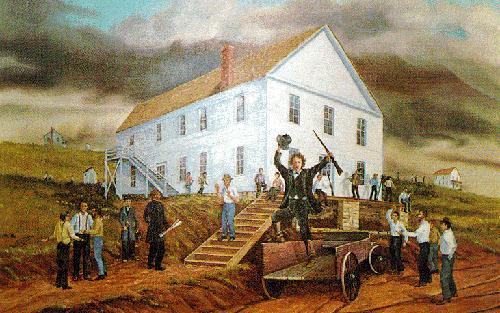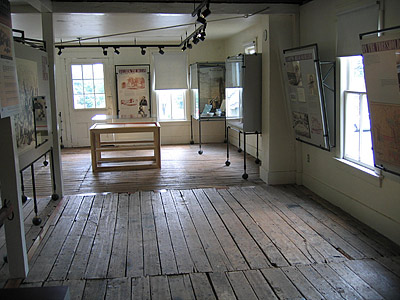


Posted on 03/01/2016 5:06:06 AM PST by Homer_J_Simpson



Excellent and informative review. I’ve just requested the book from the library.
“The names of Grant’s comrades-in-arms during the Mexican War read like a who’s who of Civil War commanders of the north and south. To illustrate this, Grant’s best man at his wedding was Julia’s cousin James Longstreet. The two ushers were Cadmus Wilcox and Bernard Pratte. ‘All three would surrender to Grant at Appomattox.’”
You couldn’t make this stuff up!
Really sad about the loss of those 20 children, but not uncommon in those days. Amazing man.
Out of Work – 1
Virginia (Description of Richmond slave market) – 1
France (On agricultural deficiencies in that country) – 1
“We Mean to Subdue You, Sir!” (Editorial on Sen. Stephen A. Douglas speech) – 2
Chicopee News – 2
The Reeder Case (Kansas news) – 2
Imagine that. A newspaper that actually edifies!
And poetry on the front page!
But the account of the Virginia slave market is harrowing. Thank you for including this.
I caught that. It's a very interesting article.
"Lee had parted from Mary and the children at Arlington on February 12 [1856]. When he registered at the Plaza Hotel in San Antonio twenty-four days later, he had completed a difficult journey from Indianola [Texas] while the roads were quagmires."
... "This was Lees first field command -- four companies of the Second Cavalry."
The commander of the Second Cavalry, the Texan Albert Sidney Johnston, had assigned Lee to be in command of Camp Cooper in the middle of a Comanche Reservation. There were 100 lodges in the Comanche village there. From Camp Cooper Lee would command expeditions chasing renegade Indians.
The Second Cavalry was a star studded unit. From the cover jacket of the book, "Jeff Davis's Own, Cavalry, Comanches, and the Battle for the Texas Frontier" by James R. Arnold (Copyright 2000):
"The creation of the Second Cavalry in 1855 was a watershed event in the history of the United States Army. Ordered to engage the Native American tribes whose persistent raids were slowing the settlement of the West, the officers of the Second were unwittingly preparing to fight each other."
Established by Secretary of War Jefferson Davis, the Second and its officers were assigned -- disregarding rmy tradition -- on the basis of merit and not seniority. Davis's innovation proved sound. Half of the full generals in Davis's Confederate army had served with the Second Cavalry prior to the outbreak of the Civil War."
Lee would eventually take over command of the Second Cavalry when Johnston was called to Washington. Upon learning of his father-in-law's death, Lee relinquished command of the Second to George Thomas and returned home to help his sick wife deal with the estate.
Any recommendations for biographies of Robert E. Lee, William T. Sherman or Jefferson Davis? I want to get up to date on those people but don’t have their stories.
Sorry, I'm not much into biographies, but I have a few that have been given to me by my sons or my wife, who know of my passion for Civil War history. I only skim them on occasion when looking for details concerning some event. So, I'm not the one to give you critical reviews of various biographies.
I was given a tattered and torn "uncorrected page proof" of the book, "Lee and Grant, A Dual Biography" by Gene Smith, that one of my sons found in a used book store. Again, I've only skim read a few parts of it. I looked the book up tonight in response to your question, The people reviewing it on Amazon gave it generally very good reviews, but others were more critical.
In looking at my copy of that book tonight, I saw where I had flagged a sentence the book attributed to Lincoln in response to the Union failure at Chancellorsville: "My God! It is horrible, horrible; and to think of it, one hundred and thirty thousand magnificent soldiers cut to pieces by less than sixty thousand half-starved ragamuffins!"
The problem is that it was Horace Greeley who said it, not Lincoln. Had the Internet been around when the author incorrectly attributed those words to Lincoln, he could have easily checked who said them.
As far as Sherman goes, you might read the book, "A City Laid Waste, The Capture, Sack, and Destruction of the City of Columbia" by William Gilmore Simms. It is not a biography of Sherman, but it is a Southern eyewitness account of what Sherman's troops did to Columbia, South Carolina in 1865.
In 1873, Sherman had to testify about the wholesale burning of Columbia during his occupation of it. Perhaps his reply to a question of why didn't he stop his troops from burning Columbia can shed some light on Sherman's character [Source: The New York Times, May 10, 1873: Link, see second page, first column]:
Q. -- You testified, a little while ago, that it was very likely they [Sherman's own men] might burn Columbia, and you permitted them, or your officers did -- permitted them to go about the town?
A. -- I could have had them stay in the ranks, but I would not have done it, under the circumstances, to save Columbia.
Q. -- Although you knew they were likely to burn Columbia, you would not restrain them to their ranks, even to save it?
A. -- No, Sir. I would not have done such harshness to my soldiers to save the whole town. They were men, and I was not going to treat them like slaves. ...
The Sewing Society – 1-2
Investigation (Congressional committee to Kansas) – 2
Chicopee News – 2
It is pretty interesting to see how many famous commanders from the Civil War served in the West, in the Mexican War or the Indian Wars.
Camp Cooper was officially closed during the departure of all Federal troops from Texas forts and other facilities after the Texas Secession Convention adopted the Texas Ordinance of Secession on February 1, 1861. General Twiggs surrendered the Federal forts and facilities in Texas on February 16, 1861. Camp Cooper was officially abandoned on February 21, 1861.
From The Handbook of Texas by the Texas State Historical Association:
Camp Cooper was on the Clear Fork of the Brazos River seven miles north of the site of present Fort Griffin State Historic Site in south central Throckmorton County. It was established by the Texas legislature in January 1856 and named for United States Army adjutant general Samuel Cooper. Its mission was to protect the frontier and to monitor the nearby Comanche Indian reservation. The area had been a campsite for three companies of the Fifth Infantry in 1851. The site was subsequently surveyed by Capt. Randolph B. Marcy and Robert S. Neighbors. The post was founded by Col. Albert Sidney Johnston in January 1856 and became headquarters for four companies of the Second United States Cavalry under the command of Lt. Col. Robert E. Lee. This was Lee's first command of a fort. He remained in charge for fifteen months, from April 9, 1856, until July 22, 1857. Captains under his command included Earl Van Dorn and Theodore O'Hara.
Although the camp initially had adequate military stores, it was plagued by severe weather, insects, dust, and irregular supply trains. Rattlesnakes were constant visitors, and Lee kept one as a pet. When he left the camp in 1857 for San Antonio, Maj. George H. Thomas took over. Thomas commanded the Cimarron expedition into Northwest Texas that same year. Troops from Camp Cooper participated in numerous campaigns and police actions against hostile Indians, including the pursuit of Peta Nocona's Comanches that resulted in the death of Peta Nocona and the recapture of Cynthia Ann Parker. Local unrest declined after 1859, when the Comanche reservation was dissolved and the Indians were removed from the area. ...
The people on the Texas frontier had been asking for some time that the Comanche Reservation be closed and moved to Indian Territory (Oklahoma). When the Indians were moved, the number of raids on settlers decreased and there was less need for the camp. [Info about the Comanche Reservation]
On the other hand, after the Federal troops left and Texas men joined Texas troop units or the Confederate Army and went to fight outside of the state, the frontier was not well defended and the edge of the frontier moved back 200 miles to the east in the face of increasing Indian raids. One of my great-great grandfathers served in a Texas Ranger frontier unit during that time. Another Texas ancestor, my great grandfather from another family, was a boy during the Civil War. I knew him when I was a boy. He remembered Indian raids in his Texas county in the 1860s.
Thanks for that very interesting history!
5.56mm
Disclaimer: Opinions posted on Free Republic are those of the individual posters and do not necessarily represent the opinion of Free Republic or its management. All materials posted herein are protected by copyright law and the exemption for fair use of copyrighted works.